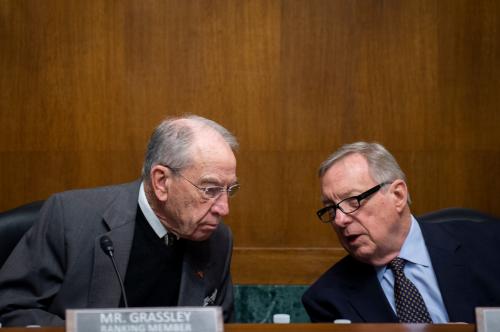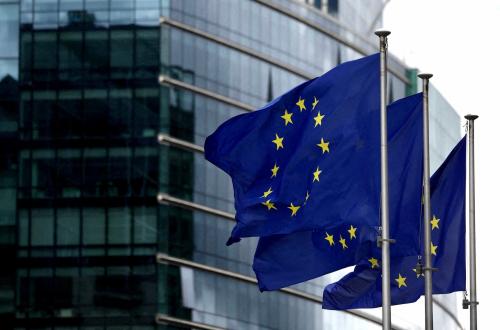Late Thursday, March 25, the dam broke in Brussels. The resulting flood will inundate Washington.
The governing bodies of the European Union (EU) reached an agreement on oversight of dominant internet platforms such as Apple, Meta (Facebook), Alphabet (Google), Amazon, and Microsoft. The interconnected nature of the internet means that the new Digital Markets Act (DMA) will have far-reaching effects outside of EU nations. The proposal is set for formal adoption in October and will take effect in 2023.
That the United States, where the internet was invented, and the home of the aforementioned platform companies, previously failed to address the policy issues associated with the internet has now cost the nation its claim to international policy leadership. The failure to develop American rules for the most powerful and pervasive platform in the history of the planet left the field wide open for others while simultaneously costing the U.S. a meaningful voice in the decisionmaking.
The American digital platform companies, after long fighting domestic regulation, are going to reap the rewards of that opposition. They will have to live with rules made by other nations—rules that some claim have protectionist overtones. These platform companies have become rich by riding on a ubiquitous internet that allowed them to “make it once and sell it everywhere.” Now, the same network that created that economic miracle has become the network whose ubiquity imposes rules even if the companies operate outside of the EU.
Interconnection internationalizes rules
We have previously seen the effect of EU-made rules on non-EU activities. The EU’s privacy-protecting General Data Protection Regulation (GDPR) has become the de facto world standard. Since the internet is the interconnection of disparate networks, the rules that one nation—or set of nations—can apply to the use of their networks end up having a residual effect everywhere else.
American companies comply with the GDPR because their businesses are international. Such a de facto implementation can end up becoming de jure, as when the state of California modeled its privacy legislation on a GDPR-like framework. Even China’s privacy rules are similar to GDPR—except with a carve out for government snooping.
The isolation of internet activity within the confines of national borders may be technically possible. The cost, however, of such Balkanization to the make-once-deliver-everywhere economics the platforms have previously enjoyed is significant.
New rules address real problems
The new law is targeted at “gatekeepers:” companies that operate a core platform that is utilized by others and are dominant in their space (more on this later). In general, the DMA prohibits those companies from using their gatekeeper power to limit the ability of others to compete. Examples of new behaviors required by the DMA include, but are not limited to:
Self-Preferencing: Amazon would not be allowed to use the information they see about third party transactions on their service to offer their own private label products. Google would not be able to preference its own shopping service in search results.
Uninstall: Apple’s iOS and Google’s Android would be required to allow consumers to uninstall any preloaded apps, including app stores.
App Stores: App developers would no longer be forced to use the Apple or Google payment systems and identity functions, but will be able to “sideload” their products and avoid the platforms’ high fees.
Interoperability: Messaging apps such as Meta’s WhatsApp would have to allow interconnection with other messaging services, just like how email interconnects across different services. As of now, interoperability among platforms themselves (e.g., interoperability between Facebook and YouTube) is not required.
Ad Targeting: Platforms that target advertising using personal data will be required to obtain “explicit consent.”
Data Access – Platforms such as Amazon would have to allow companies that sell on that platform access to the data they create, including to analytics about their products.
Failure to follow the new rules can trigger massive penalties of up to 10 percent of worldwide annual revenue for the first infraction, and up to 20 percent for repeated violations.
“Because the U.S. hasn’t”
The U.S. Congress has held innumerable hearings on the power of the digital platform companies. The findings have been expansive have raised concerning issues, but the output has been slim. What limited legislation there has been only nibbled around the edges of the issues.
In reporting on the activities in Brussels, Politico observed, “a common refrain among European officials is that they’re being forced to take action because the U.S. hasn’t.”
That the EU has been able to move faster than the U.S. can largely be attributed to local politics. That four of the top five most valuable companies in the world are U.S. digital companies (Apple, Microsoft, Alphabet, and Amazon—with Meta at number nine) has given them great political power, made U.S. policymakers fear to tread, and hung a target for European policymakers. The absence of such domestic economic and political powerhouses—and the desire to create opportunities for European companies—created a different political dynamic in the EU.
Nevertheless, the reality remains that while the digital economy moves at internet speed, policymakers in the United States have not kept pace. The result created the opportunity for the EU to speed ahead. Like in the marketplace, there is a first-mover advantage in policy matters as well. Advantage in setting digital policy now resides in Europe.
Limitations of antitrust
The EU has been aggressive in its prosecution of multiple antitrust cases against the major platform companies. While European antitrust law has a threshold generally considered to be lower than U.S. antitrust law, such actions were—as is being experienced in the U.S.– cumbersome and time-consuming, with problematic results.
In explaining the DMA, Member of the European Parliament Andreas Schwab, who led the DMA process, reflected on the inadequacy of antitrust: “the time of long antitrust cases is over during which the authorities were lagging behind the big tech companies.”
In the U.S., the Department of Justice, Federal Trade Commission, and numerous state attorneys general have filed lawsuits alleging anticompetitive activities by the dominant digital platforms. The process is reliably lengthy, lasts years, and leads to an unknown conclusion. During the pendency of the lawsuits, the alleged abuses continue, the companies become stronger, and the relevance of the issue recedes as the platforms’ power leads them into other activities.
The DMA’s message to U.S. policymakers is that meaningful policy development for the digital era cannot be delegated. The people’s representatives must step up and grapple with the tough decisions the digital economy has created.
Protectionist?
During the course of its development, the DMA’s definition of a covered “gatekeeper” company was changed in a manner that some, including U.S. Secretary of Commerce Gina Raimondo, argue targeted U.S. companies. Earlier drafts had deemed a company a “gatekeeper” and de facto bottleneck if it had at least a €65 billion market capitalization with €6.5 billion in annual revenue with at least 45 million monthly consumers and 10,000 business users. The final draft increased the size of that threshold to companies with a €75 billion capitalization and €7.5 billion in annual revenue, thus reducing the number of potential companies covered. It appears the only European company that meets these criteria is Bookings.com.
MEP Andrus Schwab poured fuel on the protectionist fire when he told the Financial Times, “Let’s focus first on the biggest problems, let’s go down the line – one, two, three, four, five – and maybe six will be Alibaba. But let’s not start with number seven to include a European gatekeeper just to please Joe Biden.” His comment was seized upon by a bipartisan group of 30 members of Congress who wrote to President Biden, “as European leaders have made clear, the DMA as currently drafted is driven not by concerns regarding appropriate market share, but by a desire to restrict American companies’ access to Europe in order to prop up European companies.”
The Economist warned that making rules that “apply in effect only to foreign firms—as does much of the tech regulation devised in Brussels—has increasingly been attacked as covert protectionism.”
What about misinformation?
The other pressing set of issues created by the internet have to do with misinformation, disinformation, and mal-information. The EU is dealing with those issues through the in-process Digital Services Act (DSA). It is anticipated that the DSA will reach a similar point in the EU policy process later this year.
In the post-Brexit United Kingdom
Having left the EU, the United Kingdom must grapple with similar issues. It, too, is way ahead of the U.S. in its policy development. The UK government has created a new Digital Markets Unit (DMU) within the Competition and Markets Authority to deal with DMA-like issues. Whereas the DMA has a mechanistic number-denominated definition of “gatekeeper,” the DMU is more flexible, targeting companies that are found to have “strategic market status,” meaning they hold substantial and entrenched market power.
Content-related issues such as misinformation and hate speech have also been addressed by the U.K. The government created new authority to deal with “online harms” and delegated it to Ofcom, the broadcast regulator.
For United States policymakers and U.S. companies the message is loud and clear: the rest of the world is moving into the void created by American inaction.
Wanted: A Western digital alliance
The linear nature of the industrial economy has been replaced with an exponential economy based on the build-once nature of digital products coupled with the deliver-everywhere capability of the internet. If nation-specific, or region-specific rules were to disassemble that economic phenomenon, it would not only be a step back in time, but also a blow to the economies of the world, including the dominant digital platforms based in the United States.
At the very time when the wisdom of the mid-20th century leaders to create Western alliances is being reinforced, the digital policy actions by the Europeans – both the EU and UK – create an opportunity for similar 21st century leadership.
A few weeks after D-Day, while the Second World War was still raging, Western democracies came together to determine their collective economic future. At the foot of New Hampshire’s Mt. Washington, they established the Bretton Woods Agreement and set the rules for the commercial and financial relations of the post-war world.
The United Nations Monetary and Financial Conference, the gathering’s official name, convened amidst transatlantic economic divisions not dissimilar to those of today. The United States’ stronger trade position—a position not unlike the strength of its digital economy today—encouraged the U.S. to prioritize free trade and fixed exchange rates. The other nations, with the UK in the lead, wanted policies to reflect their trade deficits and the need for rate flexibility. The result was a compromise of fixed-but-adjustable exchange rates. The conference also created two important international institutions, the International Monetary Fund (IMF) and what would become the World Bank.
This is where the flood that started in Brussels will inundate Washington. Western democracies must seize the moment and form a similar alliance to oversee the commercial relations of the post-industrial world. That the United States has lost its leadership position through inaction will place it in an unusual position of not bringing the strongest hand to the bidding. Yet, for the dominant digital platforms domiciled in the U.S., the priority must be to protect the “build once, sell everywhere” economics of the internet.
The dominant digital platforms lobbied the EU as actively as they have the U.S. Congress to avoid regulatory oversight. As a result of the EU’s decision, however, the fight has been redefined. The opposition to regulation must now transform from the protection of companies into the protection of the interconnected market.
In other words, that there will be rules has been established. What is important now is to make those rules work to protect consumers, competition, and the connected market.
It is time for a Western Digital Alliance that harmonizes the rules that will govern the internet on both sides of the Atlantic.
Such harmonization does not mean the policies must be identical, but that they are compatible. Herein lies the art of the possible for the U.S. government, American platform companies, and Western democracies. Just as the digital companies must be expected to consider the effects of their actions on the public interest, so must the actions of sovereign nations be expected to consider the effects of those actions on the interest of maintaining the exponential economics of the internet. To harm those economics in the name of sovereignty would be to harm the economics for all.
Internet policy compatibility, as opposed to identicality, should underpin the new Western Digital Alliance. At the same time, taking another clue from the leaders who built the back half of the 20th century at Bretton Woods, perhaps the time has come for an ongoing as opposed to occasional transatlantic structure to keep pace with the rapid changes of connected digital technologies and how to protect both the public interest and a pervasive internet.
Apple, Amazon, Facebook, Google, and Microsoft are general, unrestricted donors to the Brookings Institution. The findings, interpretations, and conclusions posted in this piece are solely those of the author and not influenced by any donation.







Commentary
U.S. regulatory inaction opened the doors for the EU to step up on internet
March 29, 2022